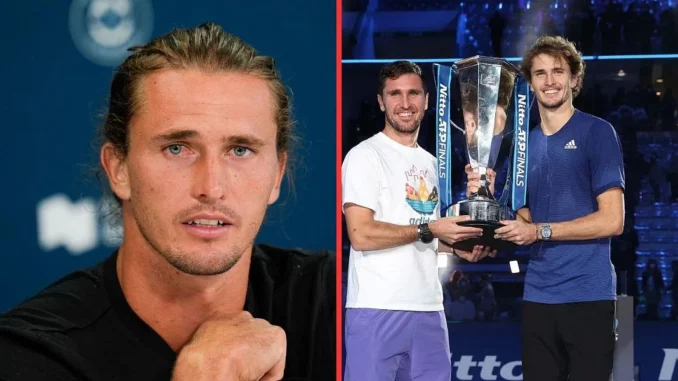
In a poignant reflection on sibling rivalry, world No. 3 Alexander Zverev recently shared a deeply personal story about a 2014 qualifying match against his older brother, Mischa, at the US Men’s Clay Court Championships in Houston. The German tennis star, known for his fierce competitiveness, revealed how his emotional bond with Mischa overwhelmed him during the match, leading him to retire while leading in the third set. “I felt so bad that I pulled out. Yeah, I pulled out, I couldn’t beat him. I just couldn’t do it,” Zverev confessed on the *Nothing Major* podcast, hosted by former ATP stars John Isner, Sam Querrey, and Steve Johnson. The admission, made during a candid conversation in 2025, highlights the unique dynamic between the Zverev brothers, whose shared journey in tennis has been both a source of strength and emotional complexity.
The Houston encounter, a grueling three-hour battle in the qualifying rounds, saw a then-17-year-old Alexander, ranked outside the top 100, take on Mischa, a decade his senior and a seasoned pro with a career-high ranking of No. 25. “We played a very long three-set match,” Zverev recalled, noting the intensity of the contest. By the third set, Alexander held a 3-2 lead with a break, poised to secure a spot in the main draw. Yet, as the prospect of defeating his brother loomed, he was overcome with guilt. “We played for like, three hours, and then it was like 3-2 in the third set. I think I was up 3-2 in the third set with a break, and I felt so bad,” he said. Unable to continue, he withdrew, handing Mischa the victory and a place in the tournament’s main draw. The match, not officially recorded in their ATP head-to-head due to its qualifying status, remains a pivotal moment in their relationship.
The Zverev brothers, born to Russian parents and former Soviet tennis players Irina and Alexander Sr., grew up immersed in the sport in Hamburg, Germany. Alexander, nicknamed “Sascha,” began playing at age three, often trailing Mischa to tournaments. “One day, when I was, I think, one year and five months old, I just picked up a little racket and I was starting to push the ball all over our apartment,” Alexander shared, reflecting on his early passion. Mischa, a left-handed serve-and-volley specialist, was both a mentor and competitor, carrying a young Sascha on his shoulders during junior events in Australia. Their bond, forged through countless practice sessions, made the Houston clash particularly fraught. Mischa, who retired in 2023 after battling injuries, later joined Alexander’s team, offering tactical insights and emotional support.
Their sibling rivalry reached the ATP main stage in 2018 at the Washington Open, where Alexander, then the defending champion and world No. 3, defeated Mischa 6-3, 7-5 in the round of 16. Mischa, ranked No. 42, admitted to fighting tears during the coin toss, overwhelmed by pride and emotion. “I had to, like, a little bit fight my tears, because I felt like, ‘It just finally came true,’” he said, cherishing the moment despite the loss. The brothers shared a heartfelt embrace at the net, with Mischa grabbing Alexander by the neck in a gesture of affection. Unlike Houston, Alexander found the strength to compete, but the emotional weight of facing his brother lingered. “We played near our best. It was unbelievable,” he said, acknowledging the competitive yet loving nature of their encounter.
Alexander’s 2025 season has been a rollercoaster, with a final at the Australian Open, a quarterfinal at Roland Garros, and a shocking first-round Wimbledon exit to Arthur Rinderknech. Now in Toronto for the National Bank Open, where he’s reached the quarterfinals to face defending champion Alexei Popyrin, Zverev continues to chase a maiden Grand Slam title. Mischa, now a coach and commentator, remains a key influence, praising Alexander’s “chess player” instincts on court. “Sascha is really focused on improving it,” Mischa said of his brother’s serve, which has climbed to 54% second-serve points won in 2024. As Alexander prepares for the US Open, the Houston memory serves as a reminder of the emotional depth behind his relentless drive, shaped by a brotherly bond that transcends competition.
Leave a Reply